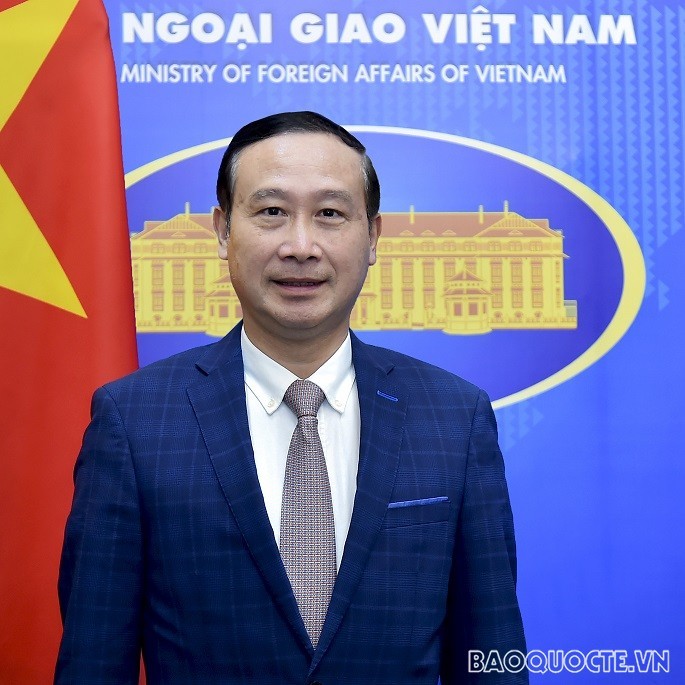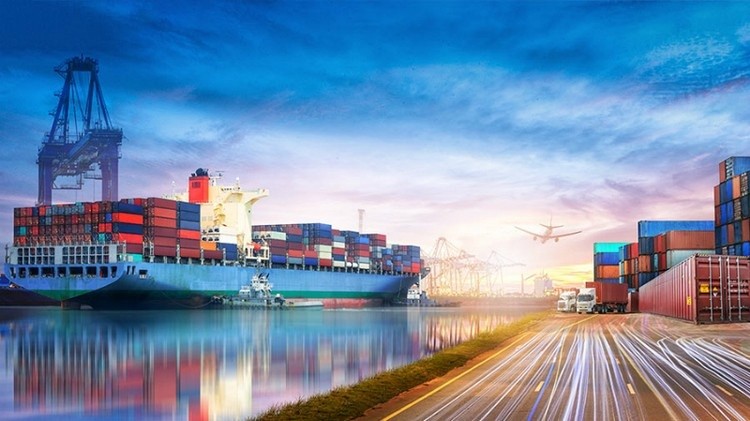
Seeking new cooperation opportunities from EVFTA
Latest
 |
| Ambassador Nguyen Van Thao. (Photo: Tuan Anh) |
An auspicious start
After two years of entry into force (August 1, 2020 - August 1, 2022), the agreement has brought numerous positive results. Despite being subject to the severe pandemic and supply chain disruptions, the trade turnover between Vietnam and the European Union (EU) has surged constantly.
The two-way turnover in 2021 reached 63.6 billion USD, up 14.8% compared to 2020. In particular, Vietnam’s exports to the EU reached 45.8 billion, up 14.2%, and imports reached 17.9 billion USD, up 16.5% compared to 2020.
In the first 7 months of 2022, Vietnam’s exports to the EU reached 27.7 billion USD, up 21.4% compared to the same period last year, and imports reached 9.08 billion USD, down 5.7%.
Exports to the EU in the first 7 months of 2022 accounted for 12.7% of Vietnam’s total exports. Notably, the trade surplus set a record of 18.7 billion USD, up 41.5% compared to the same period last year.
Most of the key products exported to the EU have witnessed high growth rates. The rate of using preferential certificates of origin under EVFTA has also increased, showing that many businesses have paid attention and made good use of tariff reduction incentives in the agreement.
Besides, the level of understanding and expectations of businesses with EVFTA is relatively high. EVFTA is one of Vietnam’s FTAs with the best utilization rate in the early years of the agreement’s implementation. This is really a favorable beginning to create momentum for bilateral trade to keep on soaring.
However, it is also necessary to recognize the fact that Vietnam has not really taken full advantage of the agreement to seek new cooperation opportunities. The EU has high demands for products, and Vietnam has not been able to satisfy these demands. Vietnam mostly exports traditional products that it is renowned for.
In the case of food and agriculture-forestry-fishery products, the EU market is one of the four largest export markets for Vietnam’s agricultural, forestry and fishery products. Every year, the EU needs to import about 300 billion USD worth of agricultural, forestry and fishery products. However, Vietnam only exports about 2-4 billion USD worth of these products.
In terms of fruit and vegetable products, the EU has a demand of about 35 billion USD worth of products per year, while Vietnam has been able to export a mere 150 million USD. Many commodity groups such as tropical fruits, exotic fruits, spices, sweet potatoes and cassava have enormous potential (with import demand increasing by nearly 40%/year).
However, Vietnam has just initially approached the EU market on a very small scale, mostly through the distribution channel of Vietnamese shops and not really penetrating this market systematically.
At the same time, Vietnamese enterprises’ competitiveness and involvement are still limited. We have not been able to combine export with high-tech investment cooperation to produce, process and distribute products, thereby deeply engaging in the sustainable supply/value chain.
Taking advantage of the golden opportunity…
In the coming time, the EU should continue to be considered as one of the leading economic partners of Vietnam, not only in trade, but also in many other areas of economic cooperation.
 |
| Vietnam can strengthen cooperation with the EU in areas such as sustainable development, response to climate change, the green economy and the digital economy. (Photo: Industry and Trade Magazine) |
The EVFTA is one of the first new-generation FTAs the EU has signed and implemented with a developing country. EVFTA not only gives Vietnam the opportunity to expand and diversify markets but also helps us to transform the economic structure towards high-value-added products, improve the investment and business environment, and strengthen cooperation with the EU in novel and crucial areas such as sustainable development, response to climate change, energy transition, the green economy and digital economy.
The EU is a partner with strengths in finance, high technology and market quality. Although the EU’s economy is facing grave difficulties due to the “double” influence of the Covid-19 pandemic and the Russia-Ukraine conflict, people’s living standards, in general, are still basically stable and record sustainable growth (estimated to reach 2.7% and 2.3% in 2022-2023 and even higher in 2024).
In the context of rapid and complicated changes in the world in general and the region in particular, the EU has been making considerable efforts to strengthen strategic autonomy, build a sustainable supply chain, and diversify partners.
Recently, the EU has issued a series of major strategies to realize this goal, such as the EU Strategy for Cooperation in the Indo-Pacific, the Global Gateway to strengthen connectivity valued at 300 billion USD, and the Strategic Compass to ensure security autonomy, including commercial shipping routes.
The EU is especially concerned about securing sustainable food security, not only within the bloc, but also in the world, particularly in Africa. Therefore, in the near future, it is likely that the EU will have more import demand for strategic products such as agricultural products, food and energy, and will seek partners to join the supply chain as well as support Africa to ensure food security.
The EU highly appreciates Vietnam’s role, position and potential in ASEAN. The organization expresses the hope that Vietnam can become its important economic partner and assist it to implement development strategies.
Till now, only 4 Asian countries have signed FTAs with the EU, and EVFTA is our great advantage. In ASEAN, only Vietnam and Singapore have signed FTAs with the EU. Our economic structure does not even have intense competition with these countries.
It can be seen that this is really a golden opportunity for Vietnam to participate more deeply in the sustainable and mutually beneficial value/supply chain with the EU and to expand economic cooperation to essential strategic areas such as sustainable development, circular economy, green economy and digital economy.
 |
| Vietnam and the EU need to continue to regularly and effectively maintain dialogue and cooperation mechanisms within the framework of the EVFTA to solve difficulties, narrow differences and promote trade. (Photo:Industry and Trade Magazine) |
Furthermore, this is an important driving force to help Vietnam implement the target of the next period of socio-economic development, as set out by the Party and State.
… to find a new direction
In order to make good use of the EVFTA and further strengthen Vietnam-EU economic cooperation, Vietnam needs stronger short-term and long-term measures.
In the short term, Vietnam is required to continue to regularly organize far-reaching promotion and advertising programs that focus on the EU; further disseminate investment and business information; and promote business linkages and cooperation in various forms, especially between export and import enterprises.
Simultaneously, more attention must be paid to solving existing and arising problems, especially those related to technical barriers, sanitary and phytosanitary measures (SPS), and further promoting goods quality control and origin inspection and certification.
Vietnam and the EU need to continue to regularly and effectively maintain dialogue and cooperation mechanisms within the framework of the EVFTA to resolve difficulties, narrow differences and boost trade.
In the long run, Vietnam is in need of a master plan for economic-trade-investment development with the EU, particularly concentrating on trade restructuring. Furthermore, it should aim at increased participation in the value chain, promote professional exporting, from planning standard large-scale raw material areas to packing, preserving, transporting and distributing, and combine export with high-tech investment cooperation in Vietnam.
At the same time, Vietnam ought to build a synchronous warning and support system for businesses to resolve commercial disputes and problems.
In order to approach the EU market, attention should be paid to linkages, including ones between the Government, associations, businesses, and EU businesses need to be further encouraged to participate in this linkage chain.
Aside from trade, Vietnam needs to take advantage of this golden opportunity to find new directions and expand cooperation opportunities into new spheres. For example, advocating the EU to support fulfilling our commitments to climate change, energy transition, economic restructuring, sustainable development; and research into enhancing Vietnam-EU-Africa tripartite agricultural cooperation to contribute to ensuring global food security as well as to participate more fully in sustainable supply chains.
Through the EU, Vietnam needs to build up connections with financial institutions and “green” credit institutions, and take advantage of cooperation in expertise, technology, capacity building, exchange of experiences, etc. in these matters.
For our part, the Vietnamese representative agencies in the EU, including the Embassy and the Delegation, will continue to make efforts to strengthen the connection and cooperation between the two sides, make use of the EVFTA and further reinforce mutually beneficial business cooperation between Vietnam and this principal partner.





















